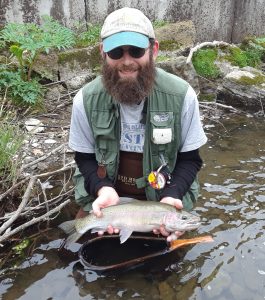Stephen M. Coghlan, Jr.

Associate Professor of Freshwater Fisheries Ecology
5755 Nutting Hall, Room 234
University of Maine
Orono, ME 04469
stephen.coghlan@maine.edu, 207.581.2880
Steve joined our department in September 2006, with a background in freshwater fish ecology and an interest in native fishes and their supporting ecosystems. Growing up in New York’s Finger Lakes region, he fell in love with the area’s woods and waters and especially its trout streams, eventually shifting his academic trajectory from economics and finance to ecology. He earned his BS and PhD at SUNY-ESF studying restoration potential of Atlantic Salmon in the Lake Ontario watershed, while serving as Teaching Assistant for Aquatic Entomology, Fisheries Biology, and Ichthyology, and as Course Instructor for Ecology of Adirondack Ecosystems. Later he conducted post-doctoral research at Arkansas State University, using otolith chemistry to study life-history patterns of trout in the Little Red River.
Currently, Steve teaches courses in Freshwater Fisheries Ecology and Management; Ecological Statistics; General Ecology; and Biophysical Economics. Past research projects at UMaine include: effects of dams and dam removal on fish communities in the Penobscot River watershed; anadromous Sea Lamprey as ecosystem engineers; fish-forest relations in headwater streams; commercial harvest impacts on White Sucker; and competition among Atlantic Salmon, Brook Trout, and Smallmouth Bass.
Recently Steve has shifted research focus towards better understanding the MetaCrisis and adapting to the Great Simplification. As the human enterprise overshoots Earth’s carrying capacity and its macroeconomic growth imperative collides with the biophysical limits of a finite Planet, how can / should people anticipate and respond to resultant ecological, economic, and societal shocks? Some rural Mainers have already turned to local ecosystems, and many more might try, for sustenance to buffer themselves during an unfolding era of scarcity, simplification, and strife. Steve and his students are combining traditional fisheries and wildlife science with biophysical economic analysis to investigate viability of “living off the land” or “homesteading” activities like fishing, hunting, firewood harvesting, maple sugaring, and gardening, including financial and fossil-fuel fuel subsidies that underwrite them.
Steve is also Maine Chapter President for the Center for the Advancement of the Steady State Economy (CASSE). In his free time, he likes to fish, hunt, tie flies, garden, play pick-up basketball, and enjoy the company of his wife and dogs on their homestead on the banks of the Penobscot River in beautiful Argyle Township.
